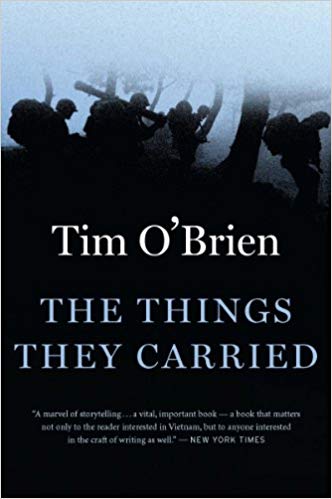

This article is an excerpt from the Shortform summary of "The Things They Carried" by Tim O'Brien. Shortform has the world's best summaries of books you should be reading.
Like this article? Sign up for a free trial here .
What happens in the The Things They Carried “On the Rainy River” chapter? How does this chapter set the tone for the rest of the novel?
We’ll look at the basic elements of The Things They Carried‘s “On the Rainy River” chapter and look at how it conveys the pressures facing young men at the start of the Vietnam War.
The Things They Carried‘s “On the Rainy River” Chapter
In The Things They Carried‘s” On the Rainy River” chapter, O’Brien looks back at how he came to be in Vietnam, and how he nearly made the choice not to be there. He grew up in a small, conservative town in Minnesota whose citizens were fiercely pro-war. There was immense social pressure to support the war effort and great disdain for the war protestors and pacifists who decried US involvement in Vietnam. It was a mark of cowardice and shame for a young man to avoid the military if he was called upon to serve.
When O’Brien received his draft notice in June 1968, he was a 21-year-old, self-described liberal who was opposed to the war. He believed that there was no justification of self-defense for the United States, no deeper humanitarian principles at stake, and no clear rationale offered by the government for why American boys were being asked to die in the jungles of southeast Asia in the first place. He’d believed that you couldn’t send boys off to war without being able to explain why.
And, besides, he’d never seen himself as a soldier. He had thought he was too smart, too worldly, too questioning of authority to fall in line with the flag-waving, jingoistic masses. He remembered thinking that there was no shortage of hyper-patriotic young men in his town eager to enlist and fight the Communists (which is what they believed the war was about), so why did O’Brien need to potentially sacrifice his life? This is a central question in The Things They Carried‘s “On the Rainy River” chapter.
None of this mattered, of course, to the people of his hometown. To them, anyone who shirked his military obligations was a traitor and a coward. There were no moral ambiguities, no gray areas. The war was about fighting and killing Communist aggressors in Vietnam and nothing more. It was a noble cause to fight for, and, if need be, to die for.
A Flight North
O’Brien recalls in The Things They Carried‘s “On the Rainy River” chapter that he began thinking of fleeing to Canada to escape the draft. He was morally conflicted. He feared the war, but he also feared the ostracism from his community and the shame he knew he would bring on his family if he became a draft-dodger. He knew that he would become an ignominious example in his town, the boy who ran away because he was too afraid to fight. He seethed with resentment at the ignorant masses who were pushing him to sacrifice his life for a cause he didn’t believe in.
Rather impulsively, he one day decided to make a break for the Canadian border, quitting his job at a meatpacking plant, and not even saying goodbye to his parents. Something inside him had snapped under the pressure. He drove his car north, stopping at an old fishing lodge a half-mile from the Canadian border.
It was there that O’Brien met the man who, with hindsight, he says saved his life. Elroy Berdahl, the proprietor of the lodge, was 81 years old and immediately saw that O’Brien was in trouble. As tourist season was over, the two of them were the only people in the lodge. They spent six days together, fishing, eating, listening to records, and hiking through the woods. But never once did Berdahl ask O’Brien why he was there or what was troubling him.
During those six days, O’Brien recalls in The Things They Carried‘s “On the Rainy River” chapter that he was tempted to steal a boat and row to the other side of the river to freedom in Canada. But, despite being so close, he could never bring himself to leave his life behind. It was not out of a sense of duty—indeed, his conscience is what told him to make a break for Canada. He still believed that avoiding fighting in Vietnam was the morally correct decision. What kept him from acting on his convictions was a fear of shame. He was ashamed, ironically, of his conscience.
A Choice Not Taken
He helped Berdahl get the lodge ready for winter, performing chores that kept his mind off the dilemma he faced. Berdahl refused to charge O’Brien for his stay, reasoning that O’Brien had performed chores that more than earned his keep—in fact, he offered the young man wages. In The Things They Carried‘s “On the Rainy River” chapter, O’Brien recounts how one day, the old man took O’Brien fishing out on the Rainy River, which separates the U.S. from Canada. Berdahl navigated the vessel far enough upstream to where they passed into Canadian waters. Without ever saying it, the old man was presenting O’Brien with a choice. He could escape now, swim the twenty yards or so to the Canadian shore, and be free. O’Brien remembers Berdahl not speaking to him in this moment or acknowledging the option he was presenting him with.
O’Brien imagined dueling forces cheering him on and willing him toward one shore or the other—faces from the past and the future. He saw Lyndon Johnson, Abraham Lincoln, his future commanding officer Jimmy Cross, Jane Fonda, Abbie Hoffman, his unborn daughter, and the young Vietnamese man he would eventually kill.
But, in the end, he realized how unrealistic his plans to build a life in Canada were. It was a romantic fantasy—he was not a brave conscientious objector. His service in Vietnam would be an act of capitulation and submission, not self-sacrifice. He was too cowardly not to fight. Seeing the choice O’Brien made, Berdahl turned the boat back toward Minnesota, toward the U.S., and toward Vietnam. This was the central decision in The Things They Carried‘s “On the Rainy River” chapter.
———End of Preview———

Like what you just read? Read the rest of the world's best summary of "The Things They Carried" at Shortform . Learn the book's critical concepts in 20 minutes or less .
Here's what you'll find in our full The Things They Carried summary :
- What the Vietnam War was like for soldiers on the ground
- How Vietnam soldiers dealth with the psychological stress of death around them
- How fictional stories can be truer than the truth






